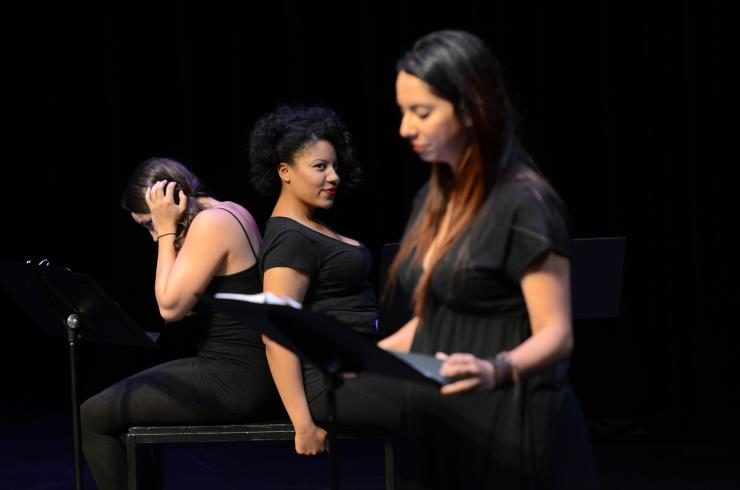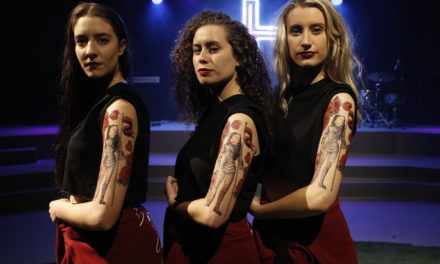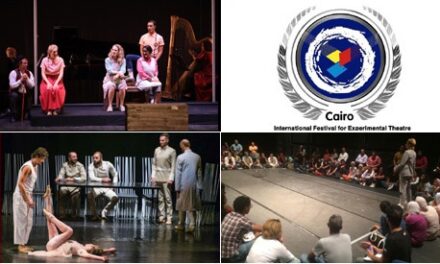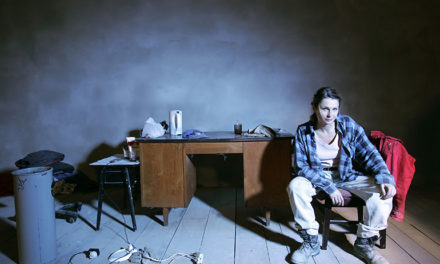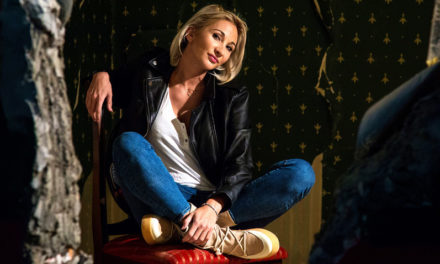Born and raised in Chicago by Dominican parents, Guadalís Del Carmen is a playwright, actress, and professional code-switcher. After graduating from Loyola University with bachelor degrees in Psychology and Journalism, Del Carmen decided to pursue a dental hygiene degree which would give her the flexibility she needed to pursue a career in acting. It was the disappointment of never seeing roles she fit into or the feeling of “they don’t know what do with me” that got her to take writing seriously.
While working as an actor in Chicago, Rosario Vargas, Founder of Aguijón Theater Company, approached Del Carmen about developing a script based on an idea she had in mind. A few months later, Del Carmen finished her first full-length play, Blowout, which was eventually produced at Aguijón in 2013. The experience set Del Carmen on a path toward playwriting that has seen her gain national attention for her bold and nuanced portrayals of Afro-Latinx identities.
Del Carmen’s plays include My Father’s Keeper, Bees And Honey, Daughters Of The Rebellion (formerly titled Tolstoy’s Daughters), Blowout, A Shero’s Journey Or What Anacaona And Yemaya Taught Me…, Sucking On Cucumbers, Blue Wall Of Silence, Racial Science, The Room Where It Happens, and coming soon, Not For Sale. Her work has been developed at UrbanTheater Company, ALTA’s El Semillero, Aguijón Theater, The Brooklyn Generator, and Montclair State University’s New Works Initiative among others.
Like many playwrights, Del Carmen will spend this summer developing her work at new play festivals across the country: The Sol Project’s Solfest in New York City, the Latinx Theatre Commons Carnaval of New Latinx Work in Chicago, and San Diego Repertory Theater’s Latinx New Play Festival. In the following interview, Del Carmen discusses these new play festivals, her work, and what she hopes to gain from this summer.
Trevor Boffone (TB): Summer 2018 is starting to look like the Summer of Guadalís with several of your new plays being developed at nationally recognized new Latinx play festivals. What has it been like to receive so much good news lately?
Guadalís Del Carmen (GDC): After throwing up from being overwhelmed…ha! It’s been a bit surreal but mostly humbling. When I started getting emails about being a semi-finalist, I thought cool, someone liked my work. But I didn’t get my hopes up, because I’m an optimist with the attitude of a realist. Also, most of my focus has been on the writing group I’m a co-coordinator of, so I wasn’t hanging on to something that may not completely come to fruition. Now that I’ve laid my calendar in front of me and looked at the things I’ve got coming up, I feel pretty blessed, proud of course, but mostly blessed. Mostly, I’m working on keeping my anxiety in check, and that’s probably what I’m most proud of.
I’m always amazed at how the world works. At the beginning of the year, I told myself I would take a break from writing because the rejections were so many. I wanted to focus on advocating for other playwrights and creating community here in NYC, something I missed from being in Chicago and in El Semillero, which is run by Isaac Gomez and Nancy García-Loza. When Nancy and Isaac came to town late last year, they got the ball rolling here and I kept it going as the NYC Latinx Playwright Circle. I asked Oscar Cabrera to join me and together we coordinate meetings where playwrights come with pages. It definitely feels like we created something special. We read each other’s work and offer feedback following the Liz Lerman method. It’s a group that I’m excited about because the plethora of stories and narratives are so indicative of the need for us to get our work seen. This group has filled me with so much love and inspiration, and it’s allowed me to nurture something bigger than me. Taking a step back and looking at everything, I feel ready. That’s the best way I can describe things.
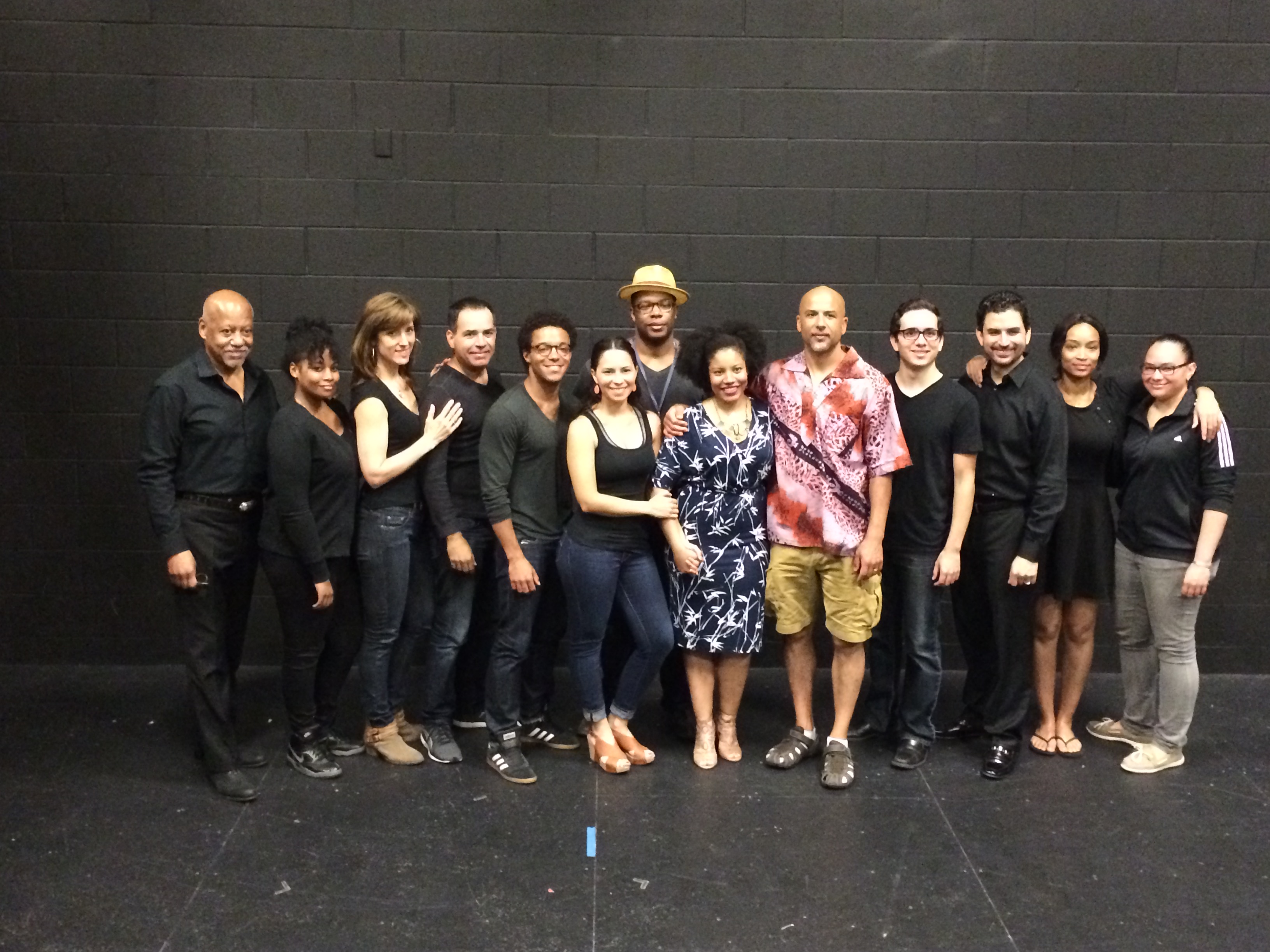
Guadalis Del Carmen and the cast of Tolstoy’s Daughters at Quick Silver Theater. Photo courtesy of Guadalis Del Carmen.
TB: In June, your play Bees And Honey will be part of the first Solfest in New York City. Notably, the festival will focus on the work of three Latina playwrights: Paola Lázaro-Muñoz, Karen Zacarías, and yourself. What do you think your work will add to the festival?
GDC: Oh man. That’s a hard question to answer. Haha! I mean, my reading is smack dab in the middle, nudged between the illustrious Paola Lázaro-Muñoz and the incomparable Karen Zacarías. I feel like a little kid that’s finally given a chance at bat with the big kids. Oh yeah, back to your question…One of the reasons I moved to NYC was to be around more Afro-Latinx folks, specifically Dominicans. I grew up in Chicago where there weren’t a lot of people that looked like me, aside from my family. I was always made to feel like I didn’t belong. So when I moved here, I had this idea of what theater was going to be like. And while I feel like I fit in, I’ve noticed that theater in NYC isn’t representative of the people that live here. There’s a huge Latinx population, with Dominicans being the largest group and we’re completely neglected on stage (and in film pero that’s for another conversation). One of my biggest takeaways from the production of Blowout is that theater is for everyone. There were so many first-time theatergoers in the audience. People who thought theatre wasn’t for them, filled the seats of Aguijón. That’s what I want to add to the festival. A crap load of Dominicans, black Latinx, and new theatergoers filling the seats, watching a story they can relate to. They gon’ get this negrita magic whether they like it or not.
I want them to walk away feeling like theater is for them, I want them to feel like they can DO theater. But most of all, I want them to feel seen. I remember what I felt when I saw In The Heights and the Dominican flag was raised high. I cried. I felt so seen. I felt so proud to be Dominican, to be Latina. It’s what inspired Blowout and kicked things off for me. Pero también, Bees And Honey is sexy AF and to see two people of color on stage having a real and raw relationship is rare. I’m so excited about this play, I mean, I’m excited about all my plays, but this is my first two-hander and I cried so many times writing it. I gave birth to this story and I was a mess after I wrote it. So I’m ready and excited to see it read in front of an audience.
I also think when we look at theater audiences, even when it’s a production of color, the homogeneity is striking. This isn’t entirely the case with theaters that perform in Spanish or places like Pregones, but there’s definitely is a glaring difference. It’s why I have the utmost love and respect for Dominique Morisseau. I wish we were friends…can you make that happen? Thanks. I digress…I saw the work she put into making sure folks of color saw Pipeline at Lincoln Theater Center. She created an advocacy around it. Kids of color were bussed in and it was so inspiring. But it also felt normal. I was like, yeah, this should be a standard. There should be regular theatergoers sponsoring kids and communities that can’t afford theater tickets. If it’s not a thing, can we make it a thing? Scratch that, can we make it the standard? I volunteer as tribute.
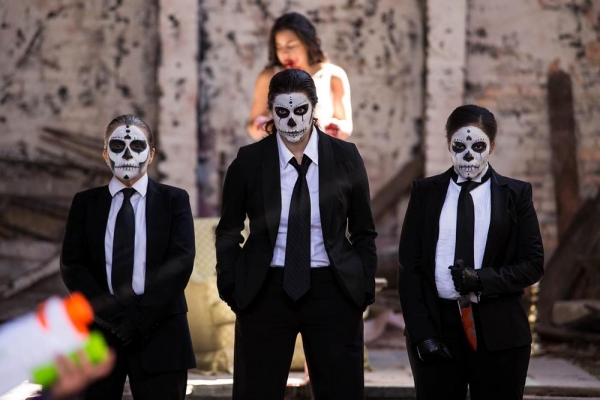
Isabel Quintero, Lorena Diaz, and Guadalis Del Carmen with (back) Stephanie Barron in Don Chipotle by Juan Francisco Villa. Photo Credit: Joel Maisonet.
TB: After Solfest, you’ll head to your hometown Chicago to develop My Father’s Keeper at the Latinx Theatre Commons Carnaval of New Latinx Work: ConeXión from July 19-21 alongside other playwrights such as Alexis Scheer, Noah Diaz, and Paz Pardo. Notably, you took part in the first Carnaval in 2015 as an actor in Magdalena Gomez’s Perfectamente Loca. What does it mean to you to return to Carnaval as a playwright?
GDC: “Look Mami! I made it!” Ha! Just kidding. I don’t know if I can describe it. I’ll be honest, a part of me is like, kinda sucks I had to leave my home just so I could come back in this capacity. But real talk, I’ve learned that everything happens for a reason. I’ve grown and learned so much about myself and life, it has affected my writing. So it feels like I got my big girl pants on and I can do big girl things now. As much as I love my family and friends, I didn’t realize how safe I was with them. This isn’t a bad thing of course, but for me, I had to step out of that safety zone and take some risks so I could be more confident in myself and my work. I’m still working on the confidence part, but I’m way ahead of where I was before. I can come back saying I wrote this thing, I’ve been working on it and I’m freaking proud of it. Also, my mom will be really happy. I haven’t told her yet, so it’s a surprise…oh wait, never mind. I forget she’s on Facebook. “Hi mami!”
TB: Can you tell us more about My Father’s Keeper?
GDC: I performed in a play a few years back where I played the wife of a closeted man. Throughout the run, I kept thinking to myself, how would growing up in this dynamic affect a kid? It got my wheels turning. When I got into Semillero, I wanted to write a story about a guy who grew up with his parents, except his father was closeted. The more I kept writing, the more I wanted to tell the father’s story along the son’s reconciliation with his father’s secret. And that’s where I feel the story ultimately lies, in secrets. These characters each hold on to something that society tells them is wrong. I also think at the root of this story is love and how love makes us protect people, whether we agree with them or not. I bring up themes of internalized racism in the Latinx community as well as homophobia, and how cultural norms can sometimes stump our personal growth.
My Father’s Keeper is my little play that could. I was really feeling some type a way about this play. I have been submitting it to things for the past two and a half years so it feels amazing to finally see it getting some love. It’ll have a reading in New York as part of Quick Silver Theater’s Citizen One readings. It was a semi-finalist in their Playwrights of Color Summit, which they’ve been doing for the past three years. It’ll be interesting to see the Chicago and NYC response to this family of secrets.
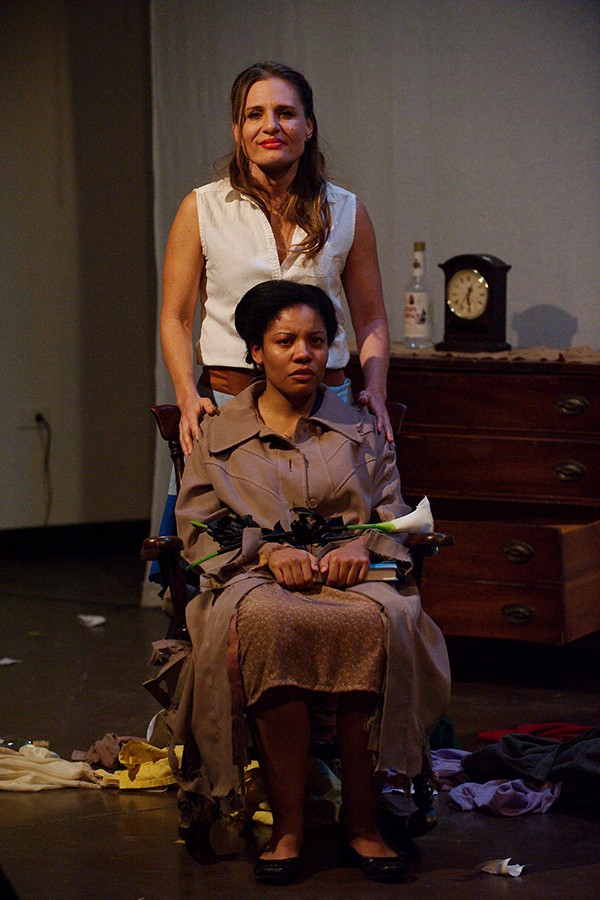
Tamika Lechee Morales and Guadalis Del Carmen in Julia De Burgos: Child Of Water by Carmen Rivera. Photo Credit: Anthony Aicardi.
TB: Why this play? Why now?
GDC: One of the other things I attempt to explore in My Father’s Keeper is how we think about masculinity and how Latinx culture is so rigid when it defines manhood. I went to India a few years ago and one of the things that struck me was men holding hands. Not lovers holding hands. Friends. I thought that was so dope. Two men who are friends can hold each other’s hands and it’s not weird or shunned. It’s affection. Between men. I can’t speak on India’s views on homosexuality, so I’ll stop the praise there. We are in such a pivotal moment right now with the women’s rights movement, #metoo, and #timesup. But we can’t have these conversations and really move forward if we’re not also talking about how we define masculinity or how restricted men are in expressing themselves. We need to redefine both definitions of genders, all genders really, and just leave room for individuality. I want this play to add to the conversation. There’s so much healing and mutual growth that needs to be done.
TB: How has the last three years informed your journey as a playwright? What have been the highs? The lows?
GDC: The lows? Maaaaaaan. I’m being fully transparent here but, I suffer from anxiety so it’s been a tumultuous journey for me to learn to deal with rejections and feel like my work is still good enough, and that I am indeed a playwright. Mental health is still something we joke about to avoid its seriousness. And in the Latinx community? ‘Chacho, olvídalo. We have such a hard time acknowledging it and getting proper treatment. The stigma is deep in our community. I’ve learned to be more open with the people I’m closest with. It makes a huge difference when you’re honest with yourself and the people around you. Playwriting has definitely been a huge outlet for me to express myself and be honest with myself as well. It’s not therapy, but art is a tool for therapy and I’m glad I’ve stuck with it and myself.
The highs have been in looking at my body of work. It wasn’t until I put my plays on New Play Exchange that I was like, “Oh snap! I’ve got an actual body of work to speak on!” It made me shift the way I think of my work as a whole. #confidence
The obvious high is getting my work produced or some kind of public attention, but seeing how people have been advocating for me and my work, even without me knowing it, goes so much more profundo. As playwrights and artists, almost everything outside of writing/creating is beyond our control. So when I get an email saying, “So and so recommended I read your work…” I am beside myself in knowing others believe in me just as much if not more than I believe in myself sometimes. There are other highs, but I’ll treasure these quietly.
I write because I love to do it and I have always been a writer, but the drive to continue submitting and the desire to see my work in public spaces comes from these highs.
TB: Rounding out your summer, you’ll head to San Diego to take part in San Diego Repertory Theater’s second annual Latinx New Play Festival where Bees And Honey will get a staged reading. Can you tell us more about Bees And Honey? What are you hoping to learn about the play in San Diego?
GDC: *In my Cardi voice* You know, is like when you love someone so much and you don’t wanna ever be without them, but then, they drive you crazy and you wanna break their face but you don’t cuz you love them? *Back to regular voice* I wanted to challenge myself with a two-hander. I also wanted to write about love because even though I get really sardonic about relationships, I’m a freaking romantic at heart. I am a SAP! So I wanted to write about two people in love. But what does love look like when there’s crap being thrown at you all the time? I used to see couples and think, man they’re really in love! A year or two later, they’ve broken up. Now, I see couples really in love and I’m like, I really hope they make it. We’re taught from young that love is this perfect and beautiful thing that can magically fix everything. But everyone leaves out the part about love being hard work. The part that isn’t pretty, the part where you’re stretched to the max at work, the part where other people depend on you and you have to be multiple places at once, the part where tragedy happens…that part. That’s where being human steps in and the fantastical ideals of love don’t measure up. So you have to put actual work into a relationship. Add to that the fact that everyone brings their own past and baggage, you’ve got a recipe for a Surprise Quiche. That’s what this play is about. Love, not quiche. It’s about two people who came together for love but work to stay together. Or at least try to. Love is messy, it’s beautiful, it’s complicated. But it’s what makes the world go round…so they say. We’ve been on this planet for, depending on your source, a really really long time, and it boggles my mind that we still can’t get our act together when it comes to love and relationships. This is my artsy fartsy way of adding to the conversation.
I feel really freaking privileged to see this play get some love on both coasts. And by love I mean flirting, we’ll see if anyone wants to…(never mind, do kids read this?) produce it. (master of I digress) The East coast and West coast are two different beasts so I’m really interested to see how it “works” on both sides of the country. But love is love and it should be the same reaction right? Ha! Can’t wait to find out.
TB: Is there anything else we should know about you?
GDC: On September 20th, my commissioned play, Not For Sale, will have its world premiere at UrbanTheater Company. It’s about how gentrification affects neighborhoods and communities and the politics that go into these city changes. It’s set in Humboldt Park, a predominantly Puerto Rican neighborhood of Chicago, and where I grew up. We think of gentrification as a Starbucks opening up on the corner of a ‘hood, or seeing white hipsters walking their kids and dogs as they enjoy a stroll where mostly kids of color used to play. While these are markers, there’s a whole machine and years of government planning that goes into these changes. I’ve learned so much in the research I’ve been doing for this play, and I think there’s a deep connection with everything happening in Puerto Rico. The production is a partnership with CLATA and will open their Destinos Festival. UrbanTheater has always been such a supporter of community work and local artists. I am over the moon with this company. I worked with them as an actor and now to have my first commission be with them feels incredible. I think it’s so important to support new artists, something not a lot of theaters do, unfortunately. That’s why I love theaters like UrbanTheater, Aguijón, and Quick Silver. They’ve supported me from the jump and have nurtured the very work that is now getting some love.
This post was written by the author in their personal capacity.The opinions expressed in this article are the author’s own and do not reflect the view of The Theatre Times, their staff or collaborators.
This post was written by Trevor Boffone.
The views expressed here belong to the author and do not necessarily reflect our views and opinions.

